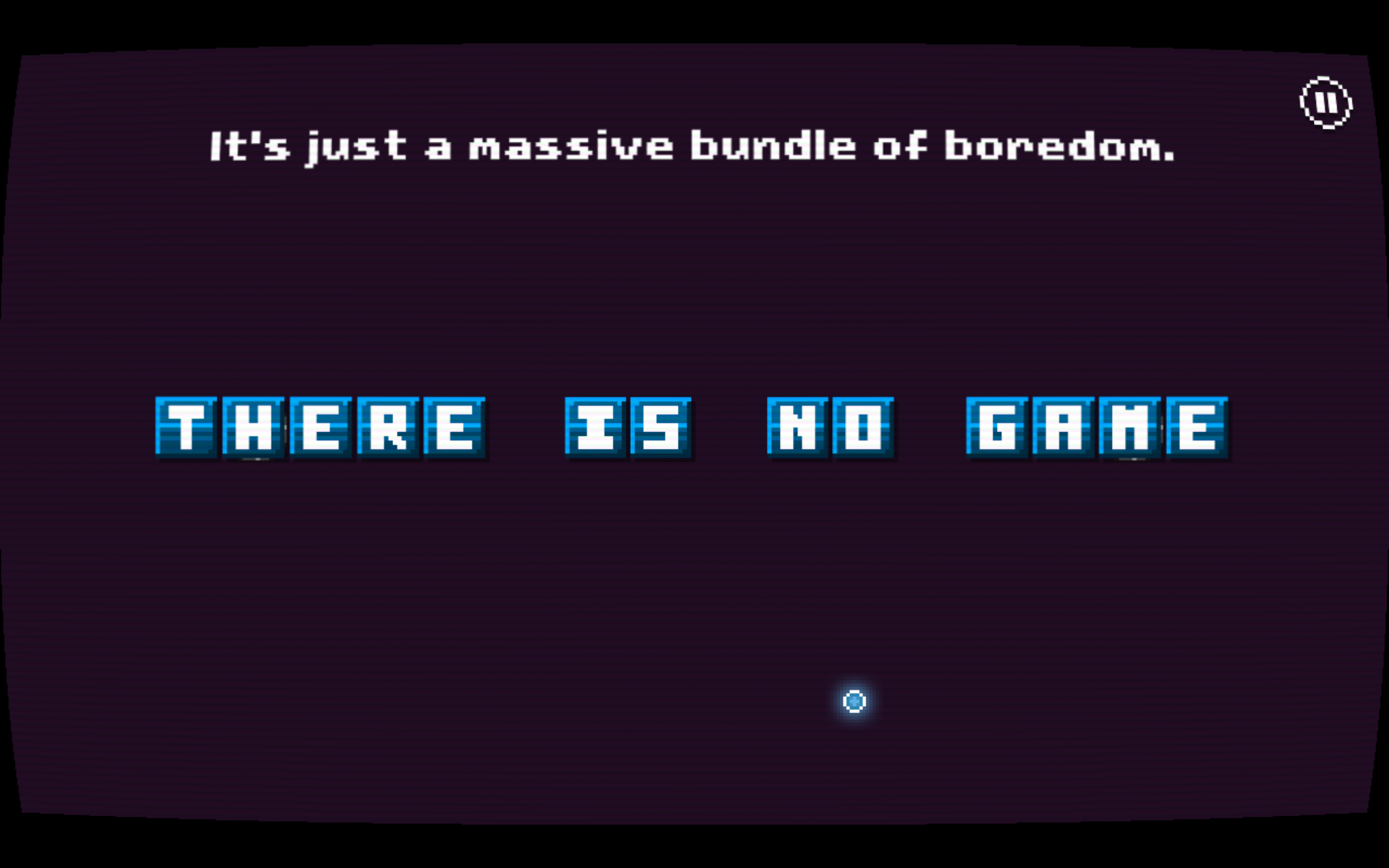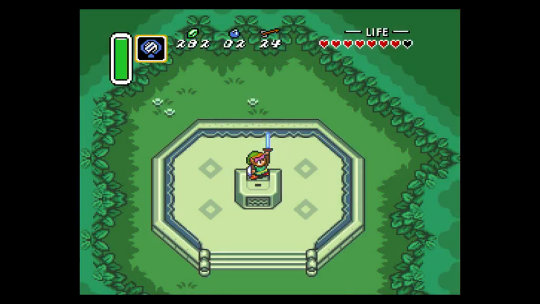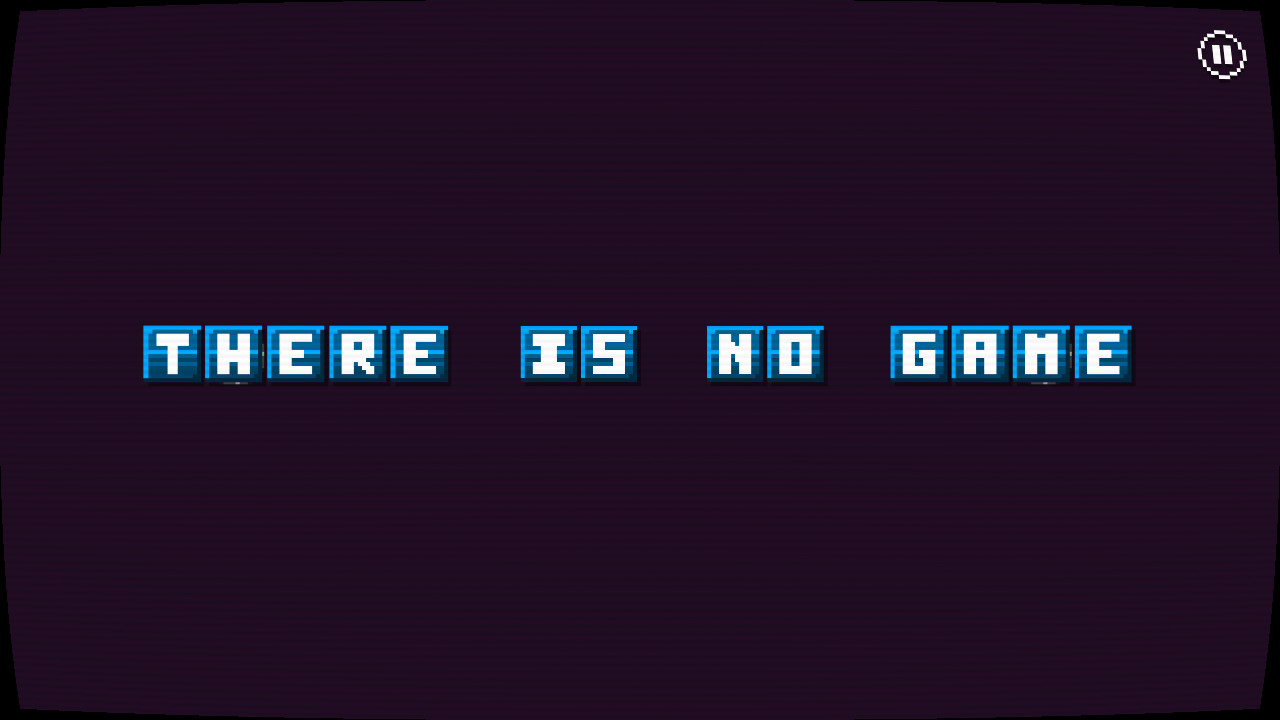Ok, I’m just pissed. It’s bad enough to title a blog post “The Role of Objectively Bad Games in CVGS,” but the fact that you immediately took the post off the website after it being published, before I could even comment is going too far. (You do realize that that means our professors aren’t going to be able to grade it, right?) I was intending on making a response to your post, so I downloaded a copy so I could write a comment outline, but screw it. This deserves a blog post of its own. Let’s start with the first line, since almost anyone reading this isn’t going to have access:
“There is No Game is a terrible game, and that’s a good thing. Ok, no it isn’t. But there’s still an infinitesimally small bit of value to be found in the analysis. (Not the actual game of course, since it’s garbage.”
Wow, right off the bat. It’s pretty rude to begin a blog post with that. I mean, come on. Objectively horrible art is rare, and almost any game assigned in this class comes with, at minimum, an implied recommendation from Ashtrick.
“Honestly, I wasn’t sure why they had assigned it, but then I remembered what other sorts of games we’ve covered, and I figured ‘nobody has this consistently good taste.’ This must be an example of our instructors just slipping up. Or maybe they were so taken in with the title that they gave us this game. Maybe they just got tired of actually playing the games ahead of time. I mean, why else would they put Powerwash Simulator and Cookie Clicker on the syllabus?”
Huh. They did address it. Better revise the rest of this post. In any case, I feel obligated to respond to your criticisms of this game. You clearly spoke from a place of utter ignorance. (I feel justified in doing this since you insulted my favorite game, and also my favorite instructors.)
“Anyone who liked this game probably spends all their time trapped in a box of malodorous Super Smash Bros. (64) playing wombats.”
What an oddly specific insult. I feel like I’m freed from any social obligations to be polite now. Let’s get into the meat of the review proper. Wait no. I’m not even going to entertain the idea that this game is so bad you can use it as a case study of what makes games bad. Let’s just respond to your reasoning, shall we?

“This game is boring. So many people I know tried it, and didn’t bother finishing it. In fact, most of the time, they just ended up stopping around Chapter 3, you know, with the microtransactions.”
Really. Your complaint about this game is that it’s boring? It generally switches between at least two modes of play per chapter, with an engaging narrator. If you’re talking about a lack of stimuli, that isn’t quite right. If you’re complaining about “fun” of gameplay, the game is plenty whimsical as well. And if you’re talking about the terrible plot, you legitimately skipped the conclusion to the game. Also, that’s Chapter 4. Chapter 3 had no microtransactions.
“Chapter 1 was so confusing and repetitive”
Seriously? Let’s address both of these points. Chapter 1 had three parts, the first one that’s basically a tutorial to anyone not familiar with the game, (and yes, you should be familiar with the process of the game, if you’d played the free Game Jam version on Steam which was basically a prototype. In fact, there’s so many homages to it throughout the game, including the squirrels everywhere, in specifically this portion and in 5) It was repetitive to stop later confusion. If you were confused by everything later on, you weren’t paying attention. The languages part was repetitive, I’ll give you that, but it’s hilarious. (Because face it, that accent is incredibly strange.) Also, the Flying Squirrel OS portion was totally novel. It sets the game’s tone. If you were turned off there, I think it’s just because you don’t like point and click adventure games.
“What was even with that Sherlock Holmes part anyhow? I wanted to punch through my actual computer monitor to shut that guy up. Also the puzzles made no sense.”
The whole thing was a LucasArts reference. Seriously. The graphics, the UI, the idiotic characters. I really wish we’d have a week just for point and clicks. (Oh man Freddi Fish and Putt-Putt were my jam!) You really should be more familiar with the genre before mocking a metagame for its deconstruction of that genre. I’d recommend Day of the Tentacle or any of the Monkey Island games if you want a good point and click. I think the humor stands on its own though. Still, it’s really unfair to criticize the game for an amazing deconstruction just because you didn’t understand the outlying genre. Likewise, the puzzles are just meant to remind you of that. If anything, the dev of this game did you a favor. These are so much easier than old adventure games used to be. You should be grateful.
“Legend of whatever also made no sense. It took a 2d game and took away the controls. Plus, it kept talking about legendary heroes and whatnot, hacking at bushes with a sword, dying to teleport? I didn’t get it. Also the puzzles were either too simple or were literally impossible.”
You really should play a Legend of Zelda game at some point. Honestly, I think I was right to talk about you being ignorant at the beginning. It seems like that’s stopping you from properly appreciating this game. The puzzles are all pretty standard Zelda-style fare. Also, the reason why you don’t have control is because this is still a point and click. Minigames are a part of the genre. The general control scheme of clicking and dragging does every single part of the game. Also, it’s important plotwise that there be a “traditional” game in the middle, the sort that are generally made. Characterwise, there needs to be someone for Game to have a dialogue with. Come on. Otherwise, how would you get to learn about Game’s backstory?

“Microtransactions suck. So did the rest of that part.”
Uh. You aren’t paying. Plus that’s the entire point. It’s a commentary on game devs feeling like they are “selling out” when they have to pivot to more commercially successful genres, at the cost of artistic integrity. This is what Chapter 6 was all about, too, with the repurposing of GG as a GPS.
“I don’t even know what to say about Chapter 5. It’s just a credits minigame. So I left.”
It’s the best chapter in the game, fight me. The point is that the conclusion is not satisfying, so you break the game again, as is your motif, only to find the plot hooks leading into the epic final act. It plays with the traditional notion of the game ending with the credits, a perfect meta interaction. Also, it even has the squirrel from earlier, and silent movie jokes, and everything. Plus, it’s a roguelike. References and comedy galore! And it even has fun minigames! Everyone’s familiar with Tetris, Pac-Man, and the 1982 Classic Game & Watches, right? All three equally important and notable games which should be a comfortable diversion for all players.
You even missed chapter 6. That leaves you without any plot whatsoever. You didn’t even see the IRL segments, which tell a deeply personal narrative about this games’ Kickstarter failing, or the romance between Game and GG. (You should totally Google the Kickstarter to see what happened.)
You need to give this game a fair chance. I don’t think you’re capable of it.


Cute gimmick for a post, it’s very meta. However, I’m unsure if metaproceduralism should be applied to blogposts.
I am also unsure if it really works in games? There’s a lot of hand-waving overexaggerated excitement about MetaGames, this week is a testament to that. What do “metagames” really accomplish? What’s the point? Could Doki-Doki make the same claims about the male gaze, objectification and inherent flaws of dating sims in some other way? Is “There’s No Game” really a metagame, or just another hidden-object-escape-room-puzzle game? Why do we care if they are meta or not? Can’t we just value their inherent narrative, visual and ludic qualities?
Can’t we just enjoy a blogpost and evaluate the strength and innovation of the claims it makes, without getting lost in its gimmicks?
I enjoy 20th century modernism in visual art for example, its not bad. But after looking at it for many years, drawing inspiration from it, painting in its style, it became trite and historic to me. Meta-ness has become so trite, so obvious, so elitist and uninteresting. That the videogame genre is having a metaness renaissance should come as no surprise to anyone, but I don’t think we should engage it with the same explosivity as we did in other genres in history. Back in the 20th century, it was a new gimmick. Now its overused and trite. I’m sorry, but writing a meta-blogpost isn’t going far enough.
Oh, I made a big mistake with this comment! Please, read the other blogposts responding to this one first!